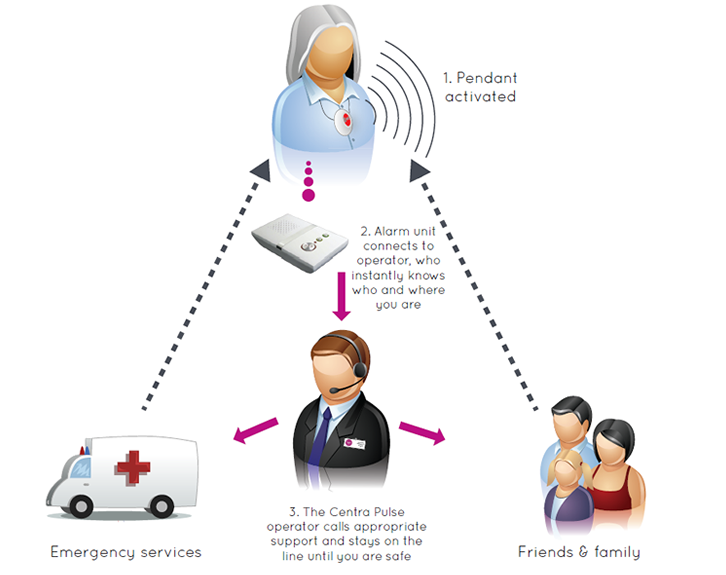TELECARE
What is Telecare
Telecare is the term for offering remote care of elderly and physically less able people, providing the care and reassurance needed to allow them to remain living in their own homes. In its simplest form, it can refer to a fixed or mobile telephone with a connection to a monitoring centre through which the user can raise an alarm. Technologically more advanced systems use sensors, whereby a range of potential risks can be monitored. These may include falls, as well as environmental changes in the home such as floods, fire and gas leaks. Carers of people with dementia may be alerted if the person leaves the house or other defined area. When a sensor is activated it sends a radio signal to a central unit in the user's home, which then automatically calls a 24-hour monitoring centre where trained operators can take appropriate action, whether it be contacting a local key holder, doctor or the emergency services.
Telecare also comprises standalone telecare which does not send signals to a response centre but supports carers through providing local (in-house) alerts in a person's home to let the carer know when a person requires attention.
It is important to note that 'telecare' is not just a warning system if someone strays from home but is also preventative measure whereby people are brought back and kept in the community through regular communication. There are now a large range of telecare services available with some of the most well known being the pendant alarm, mobile carephone system, pill dispenser, telephone prompt service the movement monitoring, fall detector and more. Multi-lingual telecare services have now been introduced opening the service up to a wider audience. All play a role in maintaining people's independence and allowing people to stay in their own homes.
Why Telecare
Living Independantly.
Aging is becoming a worldwide problem. And people will have higher expectations and want a future where they have greater control
over their own lives including being able to manage their own risks. They want
independence, and after a life-time’s work, they want and are entitled to, dignity for life.
Telecare is vital to unlocking this future.
Telecare offers individuals, their families and carers, security and peace of mind, through services that enables people to stay independent in their own home for as long as possible.
Cost Saving. If people don't use telecare, they will have to use hospital or care house. This is a big cost for the society, the insurance company and individual. Lucily technology can be a good solution, or at least a good help for such dilemma.
Peace of mind for relatives and doctors. Telecare can devlop a connect care from relatives, doctor and all concerned people. This is especially meaningful and beneficial for all parties, not only for cost saving.

How telecare
One of the simplest forms of telecare is a personal alarm. This alarm consists of a button- often in the form of a pendant worn around the neck, or on the wrist, and a base unit that works with your telephone system. Your base unit will receive a signal from your pendant and will be linked to a monitoring centre. When you push your pendant, your call will go via your telephone line to the monitoring centre, which is staffed by trained operators who will answer your alarm call on any day of the year, 24 hours a day.
Telecare therefore combines equipment in your home with a 24/7 monitoring service. A telecare user may activate their own alarm if they use a pendant. For those individuals who need more specialist help to remain in their own home, passive monitoring equipment is available. This enhanced form of telecare enables usual behaviour patterns to be monitored, and for changes outside of normal behavioural patterns (for example not getting out of bed at the usual time or leaving the house late at night) to instigate an appropriate action. Telecare monitoring covers a wide range of needs, and is intended to support people and enable them to continue living in their own home, independently or with the assistance of carers, for as long as possible. It also supports carers and families by providing additional help and support with caring responsibilities and all-important peace of mind.
It is because of this reassurance that there are now an estimated 1.7 million telecare users in the UK.
